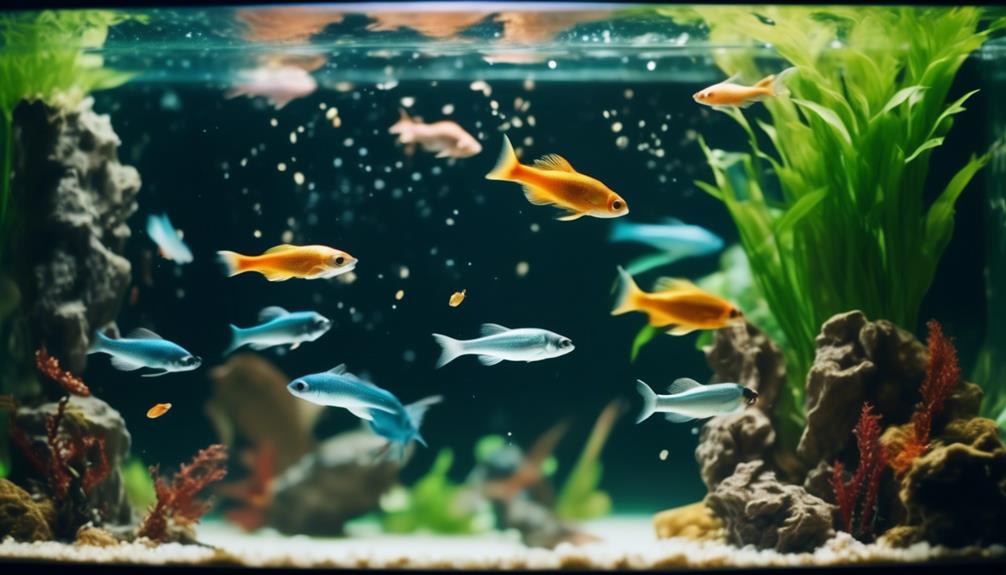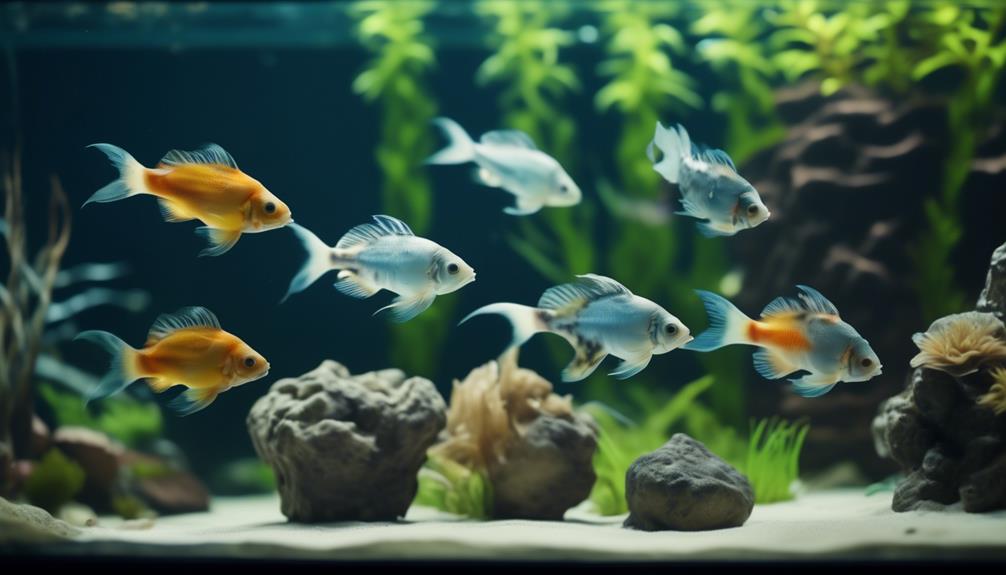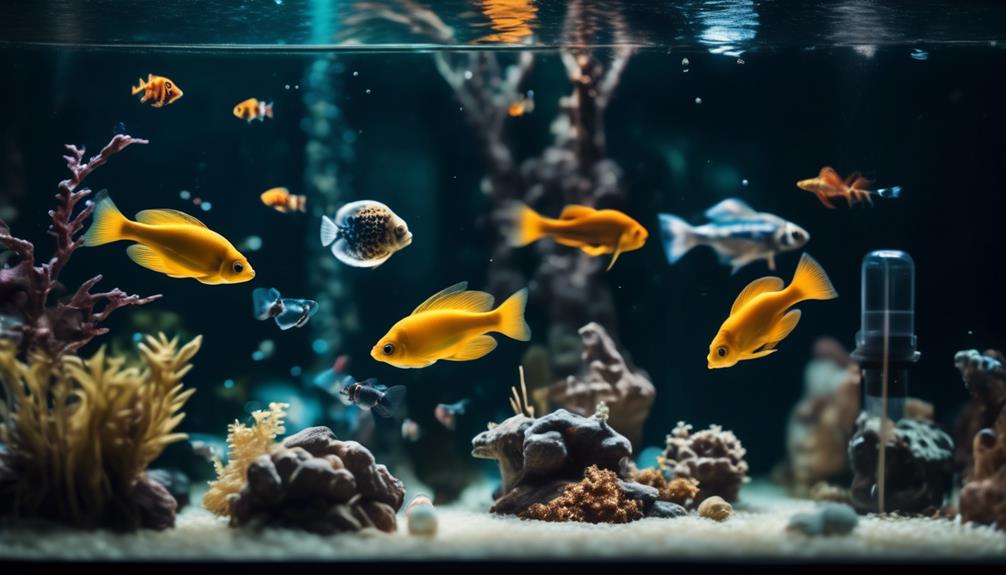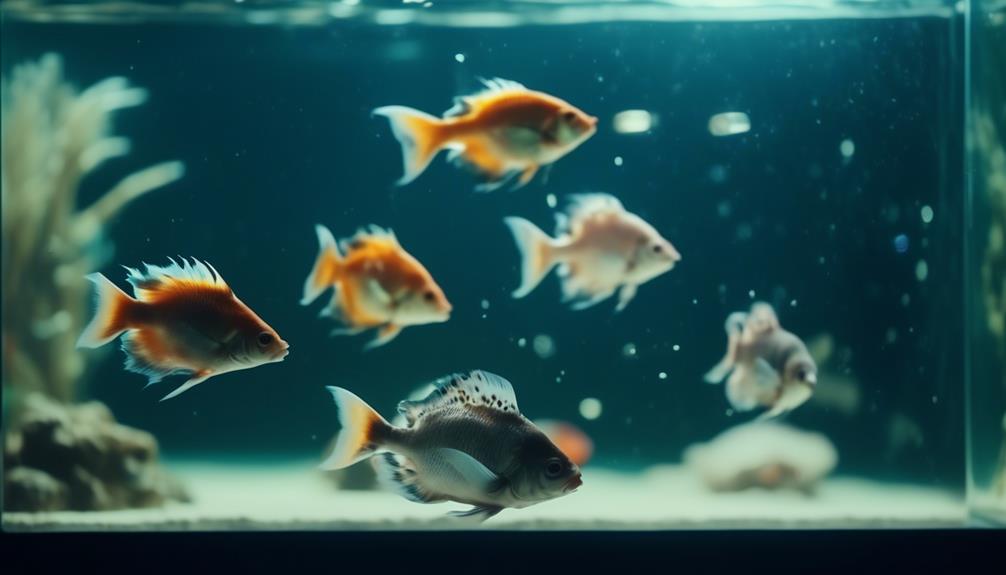In aquariums and ponds, the way fish act can tell us a lot about their health. For example, when a fish keeps its fins close to its body, it might be uncomfortable. This could be because the water isn't clean or the fish is getting sick. If a fish swims in a strange way, it could be very stressed. It's important to watch these behaviors to figure out if the fish are okay. Knowing what's normal for each type of fish helps us understand when something's wrong. When we see a fish move its tail quickly or rush to the top of the water, it could be a sign that we need to check the water or help the fish in some way. This knowledge is not just for watching; it helps us keep the fish healthy.
Some of the links in this article may be affiliate links. If you make a purchase through these links, we may earn a small commission at no extra cost to you. Thank you.
For example, if you see your fish darting around the tank more than usual, test the water for ammonia levels. High ammonia is toxic and needs to be fixed quickly. You can use products like API's Freshwater Master Test Kit to keep an eye on water quality. If you find a problem, you might need to change the water or add a water conditioner like Seachem Prime to make it safe for your fish again.
In a friendly chat, we could say: 'Hey, have you noticed your fish acting odd lately? Maybe check the water. I've had to use a test kit to sort out issues with mine before. It's pretty handy to have one around.'
Key Takeaways
Monitoring fish behavior and appearance is essential for ensuring their well-being. Observing their eating habits, fin positions, and swimming patterns can help identify potential health issues early on. Monitoring the aquarium's water quality, including its cleanliness and temperature, is also crucial for maintaining a healthy environment.
For example, if a fish is swimming erratically or refusing food, it might be unwell. Fins held close to the body can indicate stress. It's important to check that the water temperature is appropriate and that the water is clean. Poor water conditions can lead to illness. Using a high-quality filter and a dependable heater or chiller can prevent such issues.
Quick action at the first sign of a problem can prevent more serious issues and keep fish thriving.
In short, to ensure the health of fish, it's vital to observe their behavior, maintain optimal water conditions, and react promptly to any signs of distress. Good equipment, like effective filters and temperature control devices, supports a healthy fish habitat.
Understanding Fish Behavior
To keep your fish healthy, it's important to watch how they act. When fish swim around a lot near the top of the tank and move their side fins quickly, it usually means they're healthy. They should also be eating well and getting along with other fish. If they seem tired, stay by themselves, don't eat much, or their fins stay close to their body, they might be sick. This can happen when the water is dirty or they have parasites. You should check the water and fix any problems right away to make sure the fish have a good place to live.
For example, if you notice your fish are not eating as they used to, you might need to check the water's pH level or ammonia content. Simple water testing kits available at pet stores can help you with this. If you find that the water quality is poor, you can change some of the water, use water conditioners, or adjust filtration to improve the conditions.
Signs of Healthy Fish
Knowing how fish act when they're healthy helps fish keepers spot problems early. Healthy fish are busy swimmers and eat well. You'll see them moving all over the tank, using their side fins smoothly as they check things out, including the water's surface. When it's time to eat, they're right there, ready and excited. They also hang out with other fish, which is a good sign. If they start acting slow or stay away from their friends, it might mean they're not feeling great. So, watching for strong swimming, good eating, and friendly behavior can tell you your fish are doing well.
When setting up your tank, it's smart to pick a good quality water filter to keep their environment clean. Also, choosing the right food for your fish type can make a big difference in their health. Remember, a happy fish is an active fish!
Eating Patterns and Health

Examining the way fish eat is a key sign of their health. If a fish's eating habits change, this might mean something's wrong. Here are a few things to watch out for:
- Less Hunger: If a fish isn't eating as much as usual, this could be a sign they're stressed, sick, or not happy with their surroundings.
- Odd Eating Schedule: Fish that don't stick to their usual feeding times might be uncomfortable or unwell.
- Picky Eating: If a fish favors certain foods or doesn't seem interested in eating, this could point to health issues or that they're not getting the right nutrients.
By keeping an eye on these behaviors and looking for other signs of trouble, fish owners and experts can figure out if a fish needs help. It's important to watch how fish eat all the time, so any problems can be caught and fixed early.
For example, if you notice your neon tetra is skipping meals regularly, it might be worth checking if the water temperature is suitable and the tank is clean. Sometimes, a simple adjustment like ensuring their water is between 72-76 degrees Fahrenheit and checking the pH levels can make all the difference. If the problem continues, though, it might be time to consult with a vet or try a different type of food that could be more appealing to your fish.
The Clamped Fins Indicator
When you see a fish with its fins stuck close to its body, it's usually a sign that something's wrong. Healthy fish have fins that spread out and move around as they swim. If a fish's fins are flat against its sides, it might be feeling sick or stressed. This could be due to dirty water, sudden changes in water temperature, harmful bugs, chemicals, or even if the fish feels bothered too much.
| What Could Be Wrong | What You Should Do |
|---|---|
| Dirty Water | Check and fix water levels |
| Bugs | Find and treat the problem |
| Too Hot or Too Cold | Keep the water temperature steady |
| Bad Chemicals | Get rid of any harmful stuff |
| Feeling Bothered | Make the tank calm and quiet |
To help a fish with clamped fins, you need to look closely at the water they live in. Test for things that shouldn't be there, see if there are any bugs making them sick, and check if something in the tank is making them upset. By doing this step by step, you can make sure the fish stay happy and healthy.
Let's say the water is a bit murky, maybe it's time to test it and maybe change some of it. If the fish has spots or looks unwell, they might need medicine for a bug problem. If the water feels too warm or too chilly, find a way to keep the temperature just right. If you've cleaned with strong stuff lately, make sure none of it got into the tank. And if there's a lot going on around the tank, try to keep things more peaceful. Taking care of these things can make a big difference for your fishy friends.
Bottom Resting Explained

Aquarium hobbyists often worry when they see their fish staying at the bottom of the tank. This behavior could mean the fish are not healthy or something isn't right with their environment. It's important to figure out why this is happening.
First, think about the water they live in. If it's dirty or has too much ammonia or nitrate, fish get tired and might rest at the bottom. They need clean water with enough oxygen to stay active.
Next, check if the fish are sick or have parasites. These problems can make them uncomfortable and cause them to seek relief by staying still on the tank floor.
Also, consider the water temperature. Fish need it to be just right—not too hot or too cold. If it's not, they might not swim around as much.
Here's what you can do:
- Test the water: Use a water testing kit to check for ammonia, nitrate, and oxygen levels.
- Look for signs of disease: If you see unusual spots or behavior, your fish might need treatment.
- Check the temperature: Use a reliable aquarium thermometer to make sure the water is at the ideal temperature for your fish.
Lateral Laying Concerns
When a fish lies on its side at the bottom of the pond and doesn't move, it's usually a bad sign that needs quick action. This behavior could mean the fish is very stressed or sick. Problems like dirty water with too much nitrate and not enough oxygen, or health issues like parasites or extreme heat or cold can cause this.
To fix it, you should immediately check the water for anything unusual. If you think the fish might have parasites, you could need to look at its skin under a microscope. It's important to sort out these problems fast because if a fish stays on its side for too long, it might die.
For instance, if you notice your pond fish are often laying on their sides, you might want to test your water with a good quality water test kit, like the API Freshwater Master Test Kit. This can help you catch any water issues early on. If the water tests show high nitrate levels, you might consider changing some of the water and looking into products like Seachem Prime, which helps detoxify nitrates. If parasites are the issue, treatments such as API General Cure can be effective.
Water Quality Assessment

Water quality is key for the well-being of fish in a pond. Regular water tests are important to ensure the water is safe. Here's what to look for:
- Ammonia and Nitrite: These should not be in the water. If they are, it means there's too much fish waste and it's harmful.
- Oxygen: Fish need plenty of oxygen, especially when it's hot. Keep an eye on this.
- pH Levels: The water should be slightly acidic to neutral, ideally from 6.5 to 8.5, to keep fish healthy.
If you notice your fish acting strangely, check these water conditions first. Use a water testing kit from a reputable brand like API or Tetra for accurate results. It's not just about checking the levels; you need to understand what they mean to keep your pond fish thriving.
If something's off, take action fast to fix it.
Identifying Parasite Infestations
When fish act differently, it might be because of parasites, which are not always easy to spot. Knowing what to look for can help catch these issues early, making it easier to treat the fish. Here's what you should observe:
Healthy fish swim with energy, while fish with parasites might dart around or rub themselves on objects to relieve itching. If a fish's eyes look foggy or stick out, this could mean parasites are present, as healthy fish usually have clear and alert eyes. Parasites can also make fish scales stick up or cause a slimy coating, unlike the smooth scales of a well fish. Lastly, if a fish is not eating as usual and losing weight, it might be due to parasites stealing its nutrients.
For example, if you notice your fish is constantly scratching itself against rocks and has a decrease in appetite, it could be suffering from an ich infestation, a common parasitic disease in aquarium fish. If you suspect parasites, products like API General Cure can help treat a range of parasitic diseases. It's always a good idea to consult with a vet who specializes in fish to get the correct diagnosis and treatment plan.
Temperature-Related Stress Signals

Temperature changes can stress fish, which is why it's important to watch their behavior closely. Fish depend on the temperature of their surroundings to control how fast their body works. If the water is too hot or too cold, you may notice that they act differently because they're trying to deal with the change.
For example, if a fish is gasping or its gills are moving fast, it might not be getting enough oxygen. This can happen when the water temperature isn't right. If a fish is not moving much or is moving too much, it might be uncomfortable because of the temperature. You might also see them floating near the top or sitting on the bottom of the tank, which can mean they're having a hard time staying healthy.
It's like when we get too hot or too cold and start to feel sluggish or jittery. Fish feel it too, but they can't change their environment without our help. So, if you have a fish tank, keep an eye on the thermometer and make sure the water stays within the ideal range for your fish. A good aquarium heater or cooler can help with this.
Keeping the tank's temperature stable is key to keeping your fish healthy and happy.
Frequently Asked Questions
How Do Seasonal Changes Affect Fish Behavior and What Body Language Should We Look for During Different Times of the Year?
As the seasons change, fish behavior is directly affected. For example, when the water gets colder or warmer, fish might eat more or less and swim differently. They might also interact with other fish in new ways. It's important to watch for changes in how much they eat, their swimming habits, and how they act with other fish to understand their needs better.
For instance, in the spring, fish often become more active and start looking for food more aggressively, which is a sign they are ready to feed after a slower winter period. You might see them swimming faster or chasing each other in the water. This is a good time to use lures that mimic the fish's natural prey, which is more active too.
In summer, fish might go deeper into the water to stay cool because the surface gets too warm. They can be less active during the day, so early morning or late evening are often the best times to fish. During these times, you might use sinking lures or weighted baits to reach fish that are staying deep.
Come fall, many fish feed heavily to prepare for winter. They might be more aggressive toward baits and lures, which can be seen as they strike more forcefully. This is a time when baits that create a lot of movement and noise can be particularly effective, as they attract the attention of fish looking to bulk up.
In winter, fish slow down as the water cools. They eat less and might group together in deeper, warmer parts of the water. Fishing can be tougher now, so patience is key. Using smaller baits and lures, and fishing them very slowly, can help entice these less active fish.
Can Fish Exhibit Stress-Related Behaviors Due to Overcrowding, and How Can We Identify and Mitigate This Issue?
Fish can show signs of stress if they're too crowded. This might look like swimming in a strange way, picking fights, or not eating much. To stop this, we should keep an eye on how many fish are in the tank, make their space more interesting with things like plants and rocks, and make sure the water is clean and at the right temperature. For example, if we notice a fish tank is too full, we could move some fish to a different tank or set up a new one with plenty of hiding spots and clean, well-oxygenated water. This helps the fish feel safe and have room to swim, which keeps them healthier and happier.
Are There Specific Body Language Cues That Indicate Reproductive Behaviors or Nesting Instincts in Pond Fish?
Pond fish show they are ready to mate by being more active and building nests. For example, male fish might swim around more to show off to the females or to keep other males away from a certain area. This behavior is important for the continuation of their species, as it plays a role in mating and raising their young. Instead of just swimming around, they might carry materials to make a nest or dig into the pond bed, which are specific actions aimed at creating a safe place for their eggs. By observing these actions, such as a male fish flaring its fins to impress a female or chasing away other males, we can understand how they communicate and ensure the survival of their offspring.
How Does the Introduction of New Fish Into a Pond Influence the Body Language and Health of Existing Fish Populations?
Adding new fish to a pond can mix up the existing order, making the original fish act differently. They might swim in unusual ways or eat less. It's important to watch these changes because they can show the fish are stressed. To help, introduce new fish slowly so they can get used to each other. For example, you could keep them in a separate tank within the pond first. This can help make sure all the fish stay healthy and get along better.
Can Fish Communicate Distress or Discomfort to Their Owners or Other Fish, and What Subtle Signs Should We Be Aware of That Are Not Directly Related to Illness or Water Conditions?
Fish can show they are not feeling well by acting differently, like swimming in a strange way or staying away from other fish. If you notice your fish isn't acting like it usually does, it could be a sign that something's wrong, even if they're not sick or the water seems fine.
For instance, if a normally social fish is hiding more than usual, it might be stressed. Stress in fish can be caused by many things, such as too much noise, bright lights, or even the presence of aggressive tank mates. Another example is if a fish is rubbing itself on objects, which could mean it's trying to get rid of parasites.
It's important to watch your fish and get to know their normal behavior. This way, you can spot when something is off. If you see signs of distress, consider checking the water quality using a test kit and make sure the tank is a peaceful environment. Providing hiding spots with plants or decorations can also help fish feel secure. Remember, happy fish are active and engaged with their surroundings, so pay attention to changes to keep them healthy and comfortable.
Conclusion
Paying close attention to how fish act and their body language is key to knowing if they're healthy. When we watch how they eat, the position of their fins, and where they swim, we can spot early signs of trouble. It's also very important to keep an eye on the water conditions, like cleanliness and how hot or cold it is. If we see that something's not right, we need to act fast to fix any problems. This helps keep the fish and their home in good shape.
For instance, if a fish is swimming in a strange way or not eating like usual, it might be sick. If their fins are clamped down, it's often a sign they're stressed. We need to check the water to make sure it's just the right temperature and clean. If the water's too dirty or the wrong temperature, it can make the fish sick. So, it's smart to have a good filter and a reliable heater or chiller.
Acting fast when we notice these things can stop bigger problems and help our fish friends stay happy and healthy.

